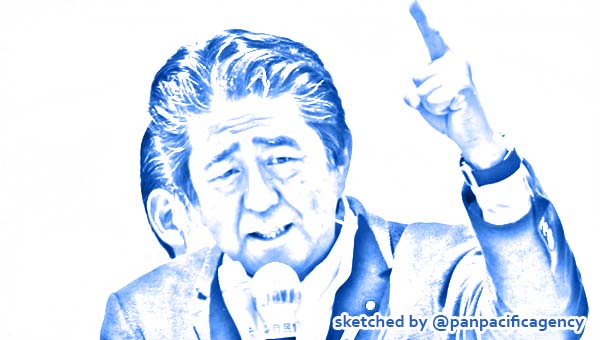Japan’s lower house passes virus bill allowing Abe to declare emergency

Photo by the Kyodo. Sketched by the Pan Pacific Agency.
TOKYO, Mar 12, 2020, Kyodo. The House of Representatives passed a bill Thursday that would allow Prime Minister Shinzo Abe to declare a state of emergency to deal with the coronavirus outbreak in Japan if needed, The Mainichi reported.
Following its passage through the more powerful of Japan’s two chambers, the bill is expected to clear the House of Councillors on Friday with opposition lawmakers who have been critical of Abe’s initially slow response to the coronavirus spread throwing their support behind efforts to ramp up containment.
The bill to revise the law on new types of influenza and infectious diseases will give the prime minister the authority to declare a state of emergency when coronavirus infections spread rapidly across the country and raise fears of a grave impact on people’s lives and the economy.
Once a declaration is made for specific areas for a limited period of time, prefectural governors can demand that residents stay indoors and ask for school closures as well as event cancelations.
Local governments can also demand that essential supplies such as medicine and food be sold to them. They can also temporarily take over private land and facilities to provide medical care.
Abe has already requested that all schools shut temporarily and big events be canceled, postponed, or scaled down, but he did so without the legal basis to enforce them.
The premier has said the legal change is to prepare for the worst-case scenario. Earlier this week, he told parliament that he will carefully weigh the need for an emergency declaration in view of its impact on society when he makes a decision.
Japan is facing what Abe has described as an “extremely important” time to prevent the virus from spreading rapidly in the country.
He gave that as the rationale behind his decision Tuesday to request that organizers cancel and postpone big events to reduce group transmission risks for an additional 10 days through late March.
The total number of domestic cases has surpassed 1,300, including around 700 from the Diamond Princess cruise ship that was under a 14-day quarantine near Tokyo in February. There were 53 new cases reported on Wednesday.
Major opposition parties have argued that a revision is not necessary because the coronavirus falls into the category of “new infectious diseases” covered by the existing law, but they eventually agreed with the ruling coalition to pass the legislation.
Both ruling and opposition party lawmakers say the government should be cautious about declaring an emergency that would suppress people’s rights.
The outbreak of the pneumonia-causing virus that originated in Wuhan, central China, has led to about 120,000 cases in 113 countries and territories, with more than 80,000 of them in China. The death toll has topped 4,000 in the crisis that was on Wednesday declared a pandemic by the World Health Organization.